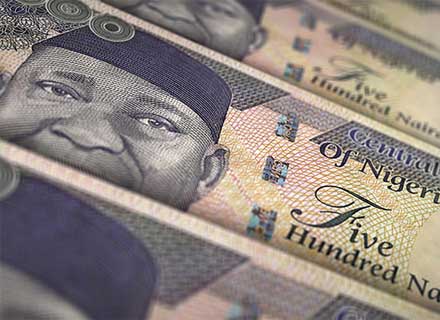The Central Bank of Nigeria has warned about taking significant measures to stop the sharp decline of the country’s currency naira, while blaming speculators for its fall.
The central bank’s acting governor Folashodun Shonubi made the above announcement after meeting President Bola Tinubu. Naira has reached a historic low following the recent dollar auction conducted by the central bank, as per a Bloomberg report.
The auction saw dollars being sold at a naira rate nearly 30% weaker than the official market rate. The action has now fuelled speculation of imminent currency devaluation, adding to the concerns raised after the inauguration of Nigeria’s new president in 2023.
Naira slipped by 0.7%, its steepest decline in nearly six months, in official trading on the Nigeria Exchange on June 2023. It eventually settled at 467.04 naira to a dollar, marking an unprecedented low point in the history of the Nigerian currency.
Nigeria’s dwindling dollar earnings and reserves, coupled with the high foreign currency demand from industries and importers, have compelled the Bola Tinubu government to manage supply and demand through multiple exchange rates. However, the ‘solution’ has led to a situation where a significant portion of the domestic population is now resorting to the black market, where the Naira is approximately 40% weaker than the official rate.
It is to be noted that President Tinubu removed the central bank’s currency controls that had kept the naira artificially high.
Nigeria’s annual inflation has risen to 24.08% in July 2023 from 22.79% in June. It is worth noting that the inflation in Africa’s biggest economy has been in double-digits since 2016, thus eroding savings and incomes, and prompting the central bank to hike interest rates to their highest level in nearly two decades.
President Bola Tinubu, since his government’s inception earlier 2023, has scrapped a popular but costly petrol subsidy, causing prices to triple, apart from ending restrictions on foreign exchange trading.
Tinubu has also pledged to establish a common foreign exchange rate to replace the official and the black-market rates. As per the analysts, the immediate reaction to these new measures has dealt a blow to the naira, sending it tumbling against the greenback.
As per the Organisation of the Petroleum Exporting Countries (OPEC), Nigeria’s economic growth in the first quarter of 2023 stood at 2.4% on a year-on-year basis.
OPEC stated that the GDP growth pace was at 3.6% in the fourth quarter of 2022. Nigeria’s economy overall grew by 3.3% in the said year.
While predicting an economic slowdown for the African country, OPEC said that high inflation would continue to burden Nigeria’s economy.
A ‘Concerned’ Tinubu
“President Tinubu was very concerned about some of the goings-on in the foreign exchange market and its impact on the average person,” Central Bank of Nigeria’s acting boss said in his latest statement.
“We discussed what could be done to stabilise the currency, what could be done to improve the liquidity in the market and also the goings-on in the parallel market,” the official added further.
To tackle the inflation demon, the Nigerian government recently unveiled a comprehensive financial package amounting to N500 billion, while the country’s central bank lifted the key policy rate by 25 basis points to 18.75% in July 2023. However, it seems none of these moves have resulted in anything fruitful so far.
In May 2023, Stanbic IBTC Bank Nigeria Purchasing Managers Index retracted to stand at 51.7 in July, after a level of 53.2 in June was reached.
“Significant action would be taken to save the naira and speculators should expect huge losses,” the central bank’s acting governor Folashodun Shonubi warned.
The official market had been fairly stable and the spreads have not fluctuated much, the official noted.
“Any intervention by the bank would be to ensure the market operates more efficiently but also reduce the negative impact on the lives of the average person,” Shonubi said.
“We do not believe that the changes going on in the parallel market are driven by pure economic demand and supply, but are touched by speculative demand from people,” he added further.
“We believe the things we’re doing, when they come to fruition, may result in significant losses to them. We are looking at it and we’re doing things which will significantly impact the market in a few days’ time and we will all see it,” the senior official concluded.
Analysts’ Take On Nigeria Economy
The African country’s loose fiscal and monetary policies were creating excess liquidity, making it difficult for the naira to stabilize against the dollar two months after authorities allowed the currency to trade freely, the International Monetary Fund (IMF) said.
“Central bank transfers to the government are increasing the naira in circulation, depressing interest rates, discouraging savings and deterring the dollar inflows that could boost naira stability,” said Ari Aisen, a resident representative for the IMF in Nigeria.
However, American investment bank and financial services giant Morgan Stanley lauded President Tinubu’s reforms to reposition Nigeria’s economy, while urging for more sound policies.
In its report titled “Tales from the Emerging World Nigeria’s New Dawn?” Morgan Stanley hailed the Tinubu-led administration for its strategic reforms to recover the dwindling Nigerian economy, while drawing a comparison with the previous administration of Muhammadu Buhari, which reportedly led Nigeria to suffer eight years of economic stagnation.

